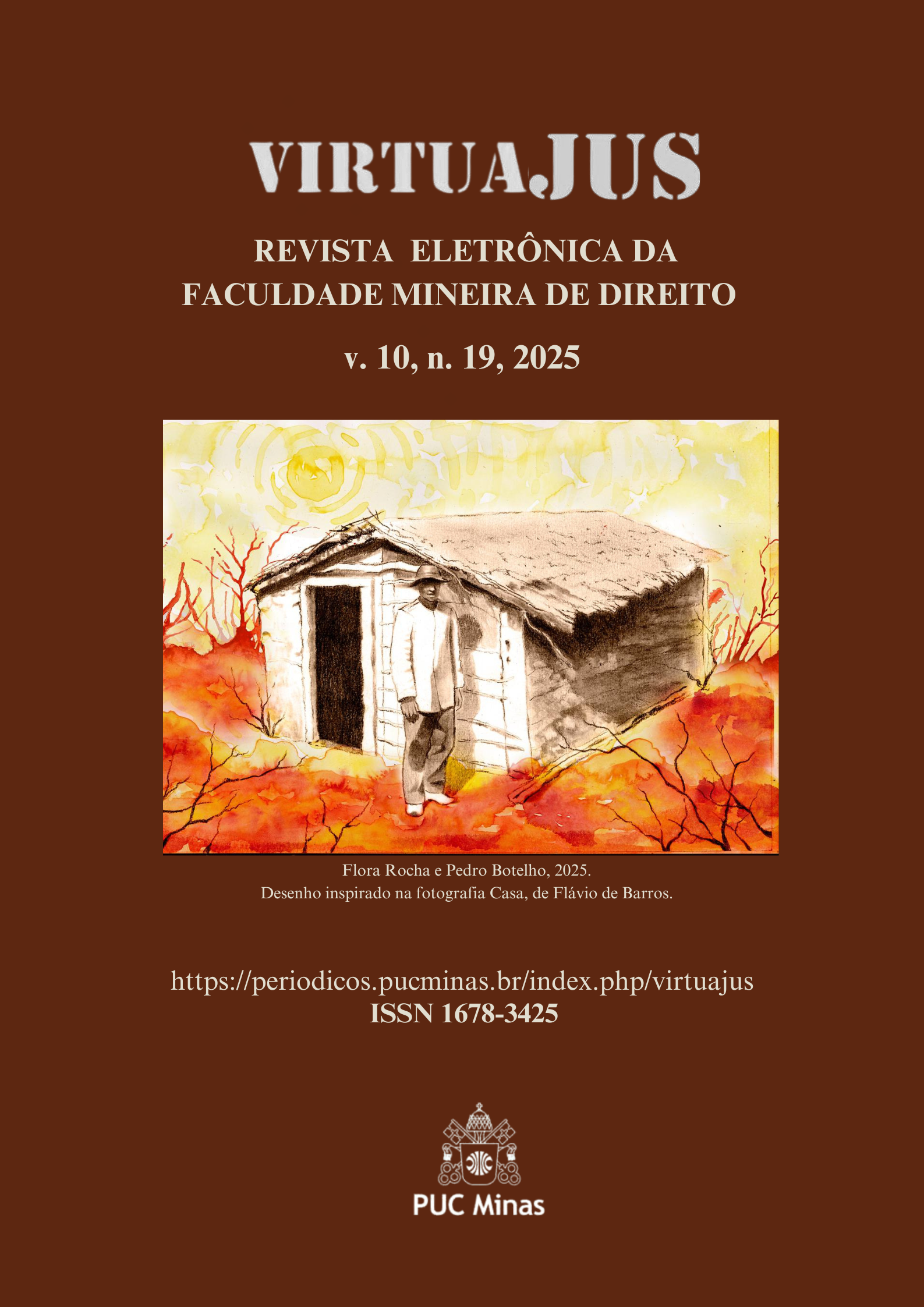The narrative of internal war and state repression
the strategy of the politics of antagonism and extrajudiciality in the Canudos War
DOI:
https://doi.org/10.5752/P.1678-3425.2025v10n19p248-261Keywords:
Republic, friend-enemy, raison d’État, War of CanudosAbstract
The War of Canudos was one of the most tragic and emblematic events in the history of independent Brazil. The armed conflict between the followers of Antônio Conselheiro and the State Forces presented itself as the culmination of a series of serious political, socioeconomic, and religious issues that existed at the end of the 19th century. This article will seek through the theoretical framework of Carl Schmitt's "friend-enemy dichotomy" and Michel Foucault's "raison d’Etát," to investigate the historical events behind the conflict, aiming to understand the elements behind the Republican regime's strategy of repression in the civil war that broke out in the “Baiano” hinterland, and how this led to enormous human consequences. Through qualitative research and adopting the premises of the hypothetical-deductive approach method, the methodology was structured in a dialogue with a variety of works and articles that deal with the analyzed theme, aiming to constitute a critical and constructive examination, intending to understand the connection between the political narrative, the concrete action of the State and the particular logic of state action in a context of exceptionality, also aiming to unravel how these factors were present in the context of the “Canudense” conflict.
Downloads
References
ARCELO, Adalberto Batista; DE ALVARENGA GONTIJO, Lucas. Teoria Crítica do Direito: o discurso dos direitos humanos frente à biopolítica, à colonialidade e ao neoliberalismo. Editora Dialética, 2023.
BUCHSTEIN, Hubertus. Enduring Enmity: The Story of Otto Kirchheimer and Carl Schmitt. transcript Verlag, 2024.
BUCHSTEIN, Hubertus. The Godfather of Left-Schmittianism? Otto Kirchheimer and Carl Schmitt after 1945. Redescriptions: Political Thought, Conceptual History and Feminist Theory, v. 24, n. 1, 2021.
CALASANS, José. Canudos-origem e desenvolvimento de um arraial messiânico. Revista USP, n. 54, p. 72-81, 2002.
CAMATI, Odair. Uma análise da razão de estado em Michel Foucault a partir do curso Segurança, território e população. Intuitio, v. 8, n. 1, p. 171-184, 2015.
CARVALHO, José Murilo de. O pecado original da República. São Paulo: O Bazar do tempo, 1°ed, 2017.
CARVALHO, José Murilo de. Os Bestializados. São Paulo: Companhia das Letras, 3ª ed., 2001.
COSTA, Cristiane; XEXÉO, José Antonio M. SEGREDOS DA GUERRA DE CANUDOS (1896-1897): TELEGRAMAS CRIPTOGRAFADOS SOBRE O FRACASSO DA EXPEDIÇÃO MOREIRA CESAR SÃO FINALMENTE DECIFRADOS. Revista de História (São Paulo), n. 183, p. a08023, 2024.
CUNHA, Euclides da. Os Sertões. São Paulo: Ed. Três, 1984 (Biblioteca do Estudante).
DE LIMA, Lidiane Santos. A Campanha de Canudos nos Jornais. Intercom – Sociedade Brasileira de Estudos Interdisciplinares da Comunicação XXVIII Congresso Brasileiro de Ciências da Comunicação – Uerj. Rio de Janeiro, 2005.
FACÓ, Rui. Cangaceiros e Fanáticos. Rio de Janeiro: Editora Civilização Brasileira, 5ª. ed. 1978.
FOUCAULT, Michel. Em defesa da sociedade: curso no Collège de France (1975-1976). Tradução: Maria Ermantina Galvão. 2. ed. São Paulo: WMF Martins Fontes, 2010.
FOUCAULT, Michel. Segurança, território, população: curso dado no Collège de France (1977-1978). Tradução Eduardo Brandão. São Paulo: Martins Fontes, 2008.
GALVÃO, Walnice Nogueira. No calor da hora: a guerra de Canudos nos jornais. Cepe Editora, 2019.
HAN, Byung-Chul. Topologia da violência. Petrópolis: Vozes, 2011.
HERMANN, Jacqueline. Canudos destruído em nome da República. Revista Tempo, v. 2, n. 3, 1997.
LESSA, Renato. A invenção da República: da aventura à rotina. In: CARVALHO, Maria A. R. (Org.). A República no Catete Rio de Janeiro: Museu da República, 2001. p. 11- 58.
LIMA JR, Jayme Benvenuto; DA SILVA–LUCIANO, José Fernando; BRITO, Oliveira–Valdênia. Execuções sumárias, arbitrárias ou extrajudiciais. Uma aproximação da realidade brasileira. Recife, 2001.
MACHADO, FELIPE DANIEL AMORIM. ENTRE SCHIMITT E ARENDT: AS BASES PARA UM DIÁLOGO SOBRE A CONSTITUIÇÃO DO POLÍTICO. Fortaleza, 2010 ( Anais do XIX Encontro Nacional do CONPEDI)
MILTON, Aristides Augusto. A Campanha de Canudos. Brasília: Senado Federal, Conselho Editorial, 2003. Vol. 5. Disponível em: . acessado em 20/08/2025.
MONTEIRO, Vanessa Sattamini Varão. Canudos: guerras de memória. Mosaico, v. 1, n. 1, p. 83-93, 2009.
NOGUEIRA, José Carlos de Ataliba. Antônio Conselheiro e Canudos: revisão histórica. Brasiliana, 1974
OKSALA, Johanna; RODRIGUES, Malcom Guimarães. FOUCAULT, MAQUIAVEL E A ARTE DE GOVERNAR. Revista Ideação, v. 1, n. 51, p. 82-92, 2025.
ROCHA, MEGT. A intervenção do Estado brasileiro e a política oligárquica na república velha. Revista de Informação Legislativa, v. 32, n. 126, p. 207-219, 1995.
RODRIGUEZ, Benito Martinez. Séculos sem fim: crônicas do centenário de Canudos. Revista letras, n. 47-48, p. 109, 1997.
RONDON FILHO, Edson Benedito. Segurança, território, população. Scielo Brasil 2011.
SAWYER, Stephen W. Foucault e o estado. Lugar Comum–Estudos de mídia, cultura e democracia, n. 58, p. 345-376, 2020.
SCHMITT, Carl. O conceito do político. Tradução, introdução e notas de Alexandre Franco de Sá. Lisboa: Edições 70, 2018.
SCHMITT, C. The concept of the political. Chicago, Ill. ; London: University Of Chicago Press, 1999.
SILVA, Camilla Cristina. Leituras sobre o Estado e a razão de Estado em Foucault, Derrida e Lênin. PROJEÇÃO, DIREITO E SOCIEDADE, v. 12, n. 2, p. 42-51, 2021.
SILVA, Washington Luiz. Carl Schmitt e o conceito limite do político. 2008.
SODRÉ, Nelson Werneck. A história da imprensa no Brasil. Rio de Janeiro: Mauad, 1999.
TOFFANO, Marcelo; RODRIGUES, Maria. O atual Estado Democrático de Direito e a influência sofrida pelos institutos da soberania e da violência na construção de políticas públicas. Argumenta Journal Law, Jacarezinho – PR, Brasil, n. 37, 2022, p. 401-432
Downloads
Published
How to Cite
Issue
Section
License
Copyright (c) 2025 Rodrigo Bernardino de Souza Bodevan

This work is licensed under a Creative Commons Attribution-NonCommercial 4.0 International License.




